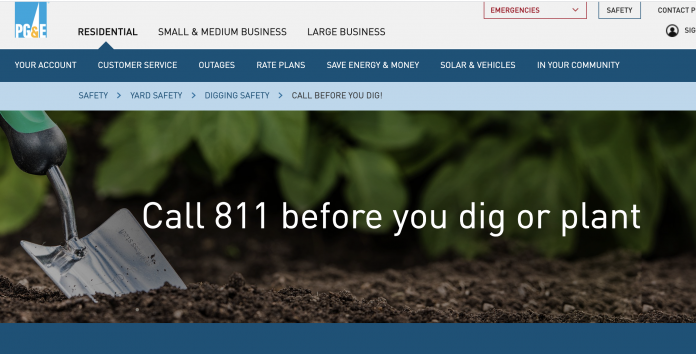With all Californians, except essential personnel, being required to stay-at-home and work-from-home until further notice due to the COVID-19 outbreak, PG&E reminds the public of the importance of calling 811 before starting projects that require digging or excavation.
While this April is unlike those in the past, this month is designated as National Safe Digging Month across the country. This nationwide public safety initiative is supported by Pacific Gas and Electric Company (PG&E) and more than 1,000 other utilities to raise awareness about the importance of having underground utility lines marked in advance of any digging project.
According to the Common Ground Alliance’s damage information reporting tool, an underground utility line is damaged every nine minutes in the United States. This adds up to more than 200,000 preventable hits to underground utility lines nationwide annually. PG&E is urging customers to help prevent dig-ins by placing a toll-free call to 811 or an online request to have gas and electric lines marked free of charge three working days before the project begins.
“Even with the disruption caused by the COVID-19 pandemic, our locate and mark crews are essential workers and still in the field every day helping to ensure digging projects of all sizes can proceed safely, without risk to life, health or property. Whether your project is large or small, from repaving a driveway to installing a fencepost, calling 811 three working days before excavating to have the locations of underground gas or electric lines marked will help keep you, your family and your neighbors safe.
The utility wrote in a statement.
- In 2019, there were over 1,600 third-party dig-ins on PG&E’s underground infrastructure across Northern and Central California.
- Of the over 1,600 dig-ins, nearly 800 resulted from not using 811 to have gas and electric lines marked in advance.
- Of the third-party (customers or construction crews) dig-ins to PG&E’s lines in 2019, residential dig-ins accounted for 25% percent.
- In 89% of residential dig-ins, 811 was not called in advance.
811 is a designated toll-free number for homeowners and professional excavators and is serviced by regional offices. Operators answering calls and emails will dispatch all necessary utilities to properly mark underground utility lines with paint or flags. Underground Service Alert of Northern/Central California and Nevada (USA North) is staffed 24 hours a day, seven days a week, and will provide Spanish and other translation services.
PG&E safe digging tips:
Mark project area in white: Identify the digging location by drawing a box around the area using white paint, white stakes, white flags, white chalk or even white baking flour.
- Call 811 or go online for a USA ticket three working days before digging: Be prepared to provide the address and general location of the project, project start date and type of digging activity. PG&E and other utilities will identify underground facilities in the area for free.
- Dig safely: Use hand tools when digging within 24 inches of the outside edge of underground utility lines. Leave utility flags, stakes or paint marks in place until the project is finished. Backfill and compact the soil.
- Mind the lines: If the utility line is visible, dig in parallel with the utility line and use all precautions when removing the soil from around the utility line.
- Be aware of signs of a natural gas leak: Smell for a “rotten egg” odor, listen for hissing, whistling or roaring sounds and look for dirt spraying into the air, bubbling in a pond or creek and dead/dying vegetation in an otherwise moist area.
PG&E urges customers to call 911 and then PG&E at 1-800-743-5000 if there’s a suspected gas leak. If an accidental dent, scrape or other damage is made to a gas pipeline, those nearby must leave immediately and alert others to avoid the area. Only when a safe distance away should anything that might create a spark such as cell phones, matches, garage door openers, vehicles, or yard equipment be used.














